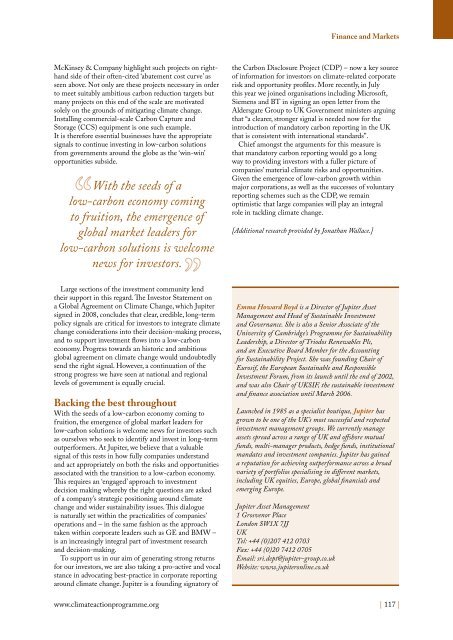Climate Action 2010-2011
Create successful ePaper yourself
Turn your PDF publications into a flip-book with our unique Google optimized e-Paper software.
Finance and Markets<br />
McKinsey & Company highlight such projects on righthand<br />
side of their often-cited ‘abatement cost curve’ as<br />
seen above. Not only are these projects necessary in order<br />
to meet suitably ambitious carbon reduction targets but<br />
many projects on this end of the scale are motivated<br />
solely on the grounds of mitigating climate change.<br />
Installing commercial-scale Carbon Capture and<br />
Storage (CCS) equipment is one such example.<br />
It is therefore essential businesses have the appropriate<br />
signals to continue investing in low-carbon solutions<br />
from governments around the globe as the ‘win-win’<br />
opportunities subside.<br />
With the seeds of a<br />
low-carbon economy coming<br />
to fruition, the emergence of<br />
global market leaders for<br />
low-carbon solutions is welcome<br />
news for investors.<br />
the Carbon Disclosure Project (CDP) – now a key source<br />
of information for investors on climate-related corporate<br />
risk and opportunity profiles. More recently, in July<br />
this year we joined organisations including Microsoft,<br />
Siemens and BT in signing an open letter from the<br />
Aldersgate Group to UK Government ministers arguing<br />
that “a clearer, stronger signal is needed now for the<br />
introduction of mandatory carbon reporting in the UK<br />
that is consistent with international standards”.<br />
Chief amongst the arguments for this measure is<br />
that mandatory carbon reporting would go a long<br />
way to providing investors with a fuller picture of<br />
companies’ material climate risks and opportunities.<br />
Given the emergence of low-carbon growth within<br />
major corporations, as well as the successes of voluntary<br />
reporting schemes such as the CDP, we remain<br />
optimistic that large companies will play an integral<br />
role in tackling climate change.<br />
[Additional research provided by Jonathan Wallace.]<br />
Large sections of the investment community lend<br />
their support in this regard. The Investor Statement on<br />
a Global Agreement on <strong>Climate</strong> Change, which Jupiter<br />
signed in 2008, concludes that clear, credible, long-term<br />
policy signals are critical for investors to integrate climate<br />
change considerations into their decision-making process,<br />
and to support investment flows into a low-carbon<br />
economy. Progress towards an historic and ambitious<br />
global agreement on climate change would undoubtedly<br />
send the right signal. However, a continuation of the<br />
strong progress we have seen at national and regional<br />
levels of government is equally crucial.<br />
Backing the best throughout<br />
With the seeds of a low-carbon economy coming to<br />
fruition, the emergence of global market leaders for<br />
low-carbon solutions is welcome news for investors such<br />
as ourselves who seek to identify and invest in long-term<br />
outperformers. At Jupiter, we believe that a valuable<br />
signal of this rests in how fully companies understand<br />
and act appropriately on both the risks and opportunities<br />
associated with the transition to a low-carbon economy.<br />
This requires an ‘engaged’ approach to investment<br />
decision making whereby the right questions are asked<br />
of a company’s strategic positioning around climate<br />
change and wider sustainability issues. This dialogue<br />
is naturally set within the practicalities of companies’<br />
operations and – in the same fashion as the approach<br />
taken within corporate leaders such as GE and BMW –<br />
is an increasingly integral part of investment research<br />
and decision-making.<br />
To support us in our aim of generating strong returns<br />
for our investors, we are also taking a pro-active and vocal<br />
stance in advocating best-practice in corporate reporting<br />
around climate change. Jupiter is a founding signatory of<br />
Emma Howard Boyd is a Director of Jupiter Asset<br />
Management and Head of Sustainable Investment<br />
and Governance. She is also a Senior Associate of the<br />
University of Cambridge’s Programme for Sustainability<br />
Leadership, a Director of Triodos Renewables Plc,<br />
and an Executive Board Member for the Accounting<br />
for Sustainability Project. She was founding Chair of<br />
Eurosif, the European Sustainable and Responsible<br />
Investment Forum, from its launch until the end of 2002,<br />
and was also Chair of UKSIF, the sustainable investment<br />
and finance association until March 2006.<br />
Launched in 1985 as a specialist boutique, Jupiter has<br />
grown to be one of the UK’s most successful and respected<br />
investment management groups. We currently manage<br />
assets spread across a range of UK and offshore mutual<br />
funds, multi-manager products, hedge funds, institutional<br />
mandates and investment companies. Jupiter has gained<br />
a reputation for achieving outperformance across a broad<br />
variety of portfolios specialising in different markets,<br />
including UK equities, Europe, global financials and<br />
emerging Europe.<br />
Jupiter Asset Management<br />
1 Grosvenor Place<br />
London SW1X 7JJ<br />
UK<br />
Tel: +44 (0)207 412 0703<br />
Fax: +44 (0)20 7412 0705<br />
Email: sri.dept@jupiter-group.co.uk<br />
Website: www.jupiteronline.co.uk<br />
www.climateactionprogramme.org | 117 |












